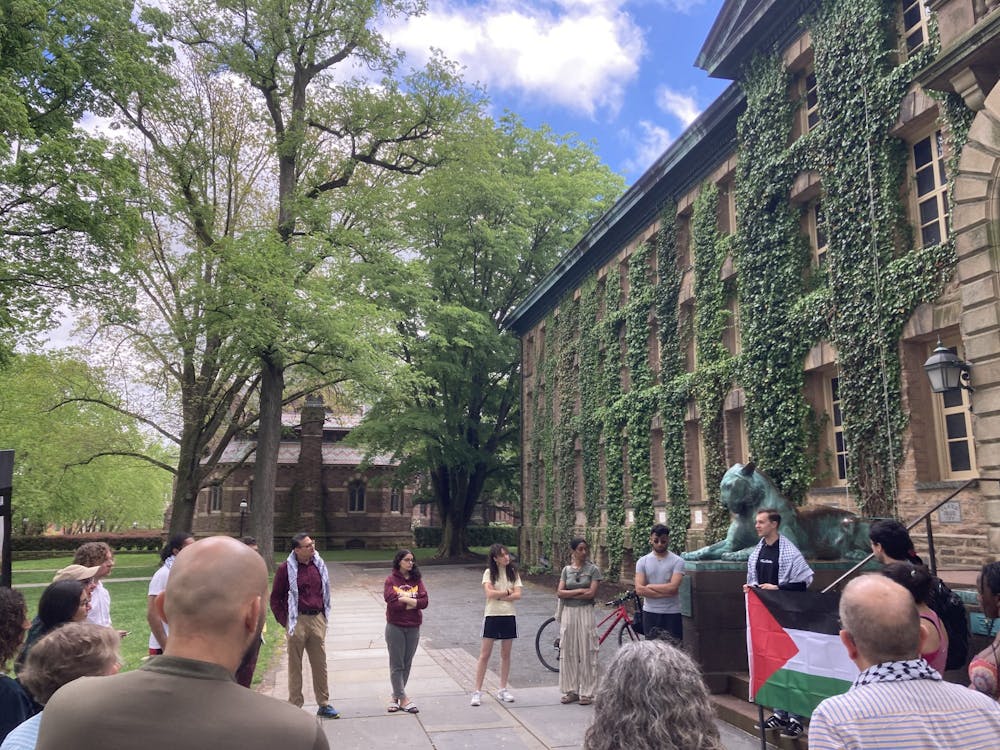Content Warning: The following article contains mentions of death and violence.
The Princeton Committee on Palestine (PCP), a student activist group dedicated to raising awareness about Palestine, held a Nakba Day vigil on Sunday, May 15 for Shireen Abu Akleh, an Al Jazeera journalist who was shot and killed in the West Bank city of Jenin.
Al Jazeera has reported that Abu Akleh was killed by Israeli forces while on assignment as a reporter, citing witnesses and the Palestinian health ministry. Other sources, including the New York Times, have reported that the source of the fatal bullet has not yet been verified.
About 20 people gathered in front of Nassau Hall for the vigil at around 12 p.m. to mourn, observe a moment of silence, and offer calls to action. The vigil also commemorated the Nakba, an event held annually on May 15, which literally translates from Arabic to “disaster” or “cataclysm.” According to the Times, Nakba observes “the 1948 displacement of hundreds of thousands of Palestinians amid Israel’s declaration of independence.”
“Nakba is a memory of the struggles my father had as a young kid,” Princeton resident Sireen Sawalha, one of the attendees, told The Daily Princetonian.
Organizers held a Palestinian flag and several wore keffiyehs, an embroidered shawl which has “become a form of resistance,” PCP president Eric Periman ’23 told those gathered.
The Jerusalem police chief ordered confiscation of the Palestinian flag at Abu Akleh’s funeral procession, which was held on May 13, according to Haaretz. (Israeli police have ordered the flag’s confiscation in the past, but an Israeli court ruled in September 2021 that flying Palestinian flags is not illegal.) Abu Akleh’s funeral became the site of violence and drew international headlines as video surfaced of Israeli police beating pallbearers and mourners.
Abu Akleh, who was 51 at the time of her death, was renowned and respected as a journalistic voice in the region. Reporting by the Times referred to Abu Akleh as an “acclaimed Palestinian American broadcaster” and “one of the leading chroniclers of the Israeli-Palestinian conflict.”
Periman, wearing a “Free Palestine” sweatshirt under his keffiyeh, addressed the group, characterizing the killing of Abu Akleh as “an intentional murder.” Following a moment of silence for Abu Akleh, Periman invited community members to speak.
“What gives me hope is people like you, people who come out and speak for the other side,” one middle-aged vigil-goer said to the group. “There is hope from the younger generation. The older generation is kind of resigned.” (The ‘Prince’ was unable to determine the identity of this person.)
“The world should be fair for everyone, but unfortunately is not fair for Palestinians,” she continued.
Sawalha held a sign with the last picture she ever took of her brother, Iyad Sawalha, which also showed the years of his birth and death, 1974–2002. Sawalha told the ‘Prince’ in an interview that her brother was 15 years old when he was first arrested. She said that he was following the example of those around him, participating in marches, throwing rocks, and “defending their rights, defending their families.”

Iyad Sawalha was later imprisoned for nine years, and then killed in 2002 after a three-week manhunt by Israeli forces, which had accused him of being a leader of the militant group Islamic Jihad, and of “masterminding two attacks on Israeli buses that killed 31 people” and other acts of violence, according to the Times.
“So, somebody like him, being treated by media and everybody as a terrorist — it hurts me a lot,” she continued. “And people need to understand the struggle — the daily struggle — Palestinian people [under]go, just from one city to another, to walk to a supermarket, to school. The harassment in checkpoints. Making you angry from inside.”
One community member, identifying himself as Leon, said at the vigil, “I refuse to accept any term other than assassination,” referring to Abu Akleh’s death. “This was a clear assassination by the Israeli forces,” he added.
“I do feel optimistic though,” Leon continued. “Because thanks to God and thanks to Al Jazeera and thanks for the footage that everyone in the world has seen of that casket taking a nosedive, and of Israeli forces beating up the bearers of this casket, Israel has shot itself in the foot — and I’m grateful for it.”
Yousuf Tariq-Shuaib ’22, another student at the vigil, also spoke in front of Nassau Hall.
“A lot of people are misinformed that this is some sort of religious conflict between Judaism and Islam but in reality it’s not — and this assassination kind of showcases that, because Shireen wasn’t Muslim, she was a Palestinian Christian,” he said to those gathered.
“Palestinians aren’t just Muslims, they’re a whole host of people,” Tariq-Shuaib added. “There’s Arabs, there’s Christians, there’s Muslims, there’s Jewish people, there’s all sort of religions that are a part of it, and in reality it’s an apartheid against Palestinians who hold ethnic and cultural and traditional heritage to this land.”
PCP also live-streamed the event on their Instagram for attendees who were not on or around campus at the time.
The student group has been especially active on campus this spring. They supported a referendum on the Undergraduate Student Government ballot that called on the University to halt all use of Caterpillar equipment due to its use by Israeli forces in demolition of Palestinian homes. PCP also held a protest against University-sponsored summer programs in Israel outside of the Center for Jewish Life and organized weekly gatherings outside of Frist Campus Center for “Keffiyeh Thursdays.”
Hope Perry is the Head Podcast Editor at the ‘Prince’ who has covered USG, U.S. politics, and student activism. She can be reached at hperry@princeton.edu or on Twitter @hopemperry.
Gabriel Robare is the Head Puzzles Editor at the ‘Prince’ who has covered theater, baseball, and campus life, among other things. He can be reached at grobare@princeton.edu or on Twitter @gabrielrobare.








